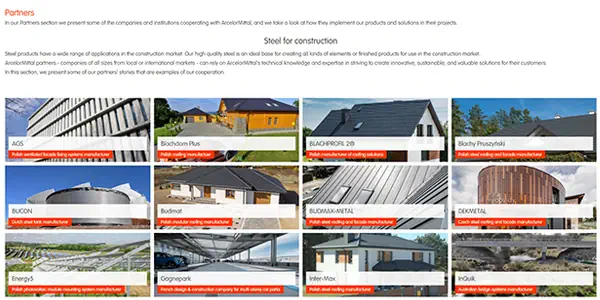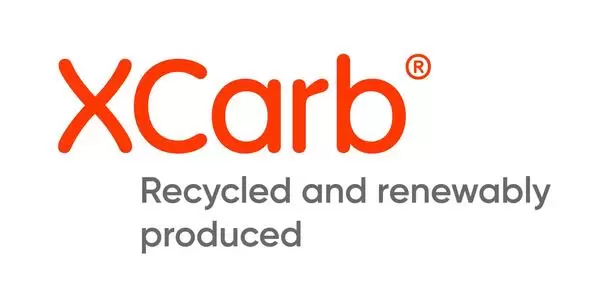Flat products
XCarb® recycled and renewably produced flat products are made with 100% renewable energy and a guaranteed minimum recycled steel content of 75%.
- Hot rolled coils present a carbon footprint of just 532 kg CO2e/t.*
- Hot dip galvanised coils with Magnelis® coating: Thanks to the exclusive use of XCarb® RRP hot rolled coil, the carbon footprint of Magnelis® can be reduced to 797 kg CO2e/t.**
- Granite® and Estetic® organic coated steels: Produced from XCarb® RRP hot rolled coil, ArcelorMittal’s decarbonised organic coated steels present a carbon footprint of 1030 kg CO2e/t.***
- Heavy plates (in S355 and other grades) will be available with a carbon footprint of around 1100 kg CO2e/t of steel produced. An EPD is expected to be published soon.
*Compared to 2230 kg CO2e/t for conventionally produced hot rolled coils
**Compared to 2570 kg CO2e/t for conventionally produced hot dip galvanised coils with Magnelis® coating
***Compared to 2720 kg CO2e/t for conventionally produced organic coated steel
Related news and technical articles
New jumbo shapes available!
16 April 2024ArcelorMittal has recently launched two new record wide flange shapes of up to 1488kg/m (1000lbs/ft)! W14x930 and W14x1000 are approved per ASTM A6 and available in A992 and A913 grades.
Product newsDownload the 2024 Sections & Merchant bars sales programme!
3 April 2024ArcelorMittal Europe - Long Products has released the 2024 edition of its complete sales programme of hot rolled steel sections and merchant bars, including XCarb® recycled and renewably produced sections and merchant bars.Visit our Document library to download your copy.
Website news
XCarb® recycled and renewably produced
XCarb® recycled and renewably produced (XCarb® RRP) steel is ArcelorMittal’s low carbon emission steel offer developed to reduce the CO2 footprint of steel production and thus the construction industry. It is produced in an electric arc furnace (EAF) using 100% renewable electricity and high levels of scrap steel. The electricity used in the steelmaking process is independently verified by a Guarantee of Origin proving it is from renewable sources, such as solar and wind power.*
All of our products available in XCarb® recycled and renewably produced steel are (or will soon be) certified by Environmental Product Declarations (EPDs).
*This is ensured by purchasing Renewable Energy Certificates, a market-based offering that certifies the bearer owns a specific amount (in megawatt-hours) of electricity generated from a renewable energy resource.
Long products
To produce XCarb® recycled and renewably produced steel, ArcelorMittal Europe – Long Products uses 100% scrap, and 100% of the electricity required for the steelmaking comes from renewable sources.
- Sections and merchant bars are available with a carbon footprint of 330 kg CO2e/t of finished product.
- The EcoSheetpile™ Plus range covers XCarb® RRP steel sheet piles with a carbon footprint of 370 kg CO2e/t of finished sheet piles.
- Reinforcing steel in bars and coils has a carbon footprint of 300 kg CO2e/t of finished product, which is far below the average carbon footprint of other rebars available on the market.
Useful documents
MorePanels & profiles
ArcelorMittal Construction, producer of innovative construction solutions for roofing, cladding, flooring, and light steel structures, is now offering sandwich panels and long span decking made from XCarb® recycled and renewably produced steel:
- Hacierco® long span decking profiles are now available with a carbon footprint reduction of up to 60%.
- Ondatherm® sandwich panels with a PIR (polyisocyanurate) core and a thickness of 80 mmm are estimated to have a 45% lower carbon footprint than the same panel produced with conventional steel.
EPDs for XCarb® RRP Ondatherm® sandwich panels and Hacierco® long span decking are expected to be published soon.
How does XCarb® RRP reduce the carbon footprint of buildings?
XCarb® solutions, which are now available for the majority of building applications, such as foundations, structures, flooring, facades, and roofing – and potentially joinery, fittings, and equipment - can lead to an overall carbon footprint reduction of 40% at building level (taking into account modules A to C).
- Thanks to the use of XCarb® RRP steels for structure and facades, the carbon footprint of an industrial or commercial building of 1300 m2 can be reduced by around 40%.
- For a 24 m double-span logistics warehouse, the carbon footprint reduction is also approximately 40% when using XCarb® RRP steels in its structure, facade, and roof components.
Looking at finished steel products made from XCarb® RRP steel for different building components, carbon reduction can be as follows:
- Rolled steel section: -60% CO2
- Composite flooring sheet: -60% CO2
- Facade and roofing sandwich panel: -36% CO2
- Cold formed profile: -64% CO2
- Roofing profile: -57% CO2
- Garage door: -36% CO2
At the end of a building's life or during renovation operations, XCarb® steel solutions can also be 100% recovered and are recyclable.






































